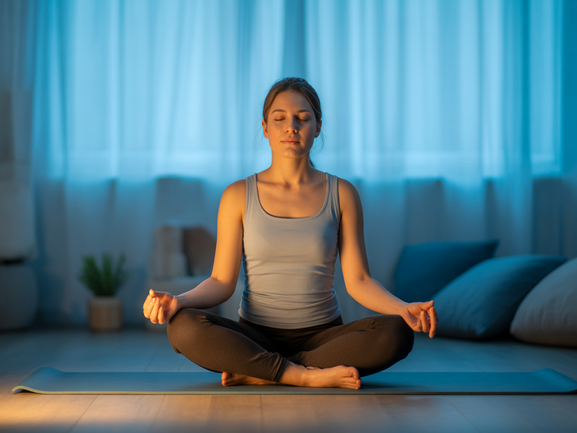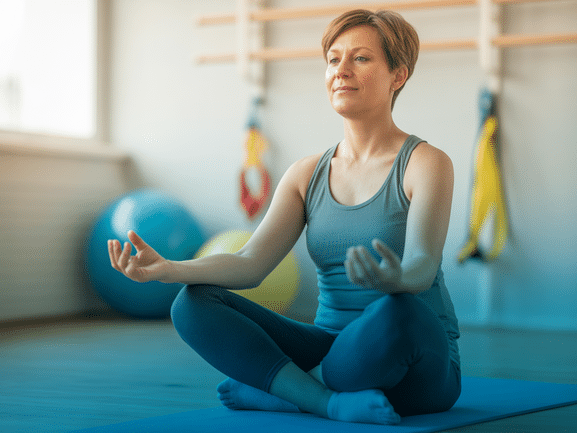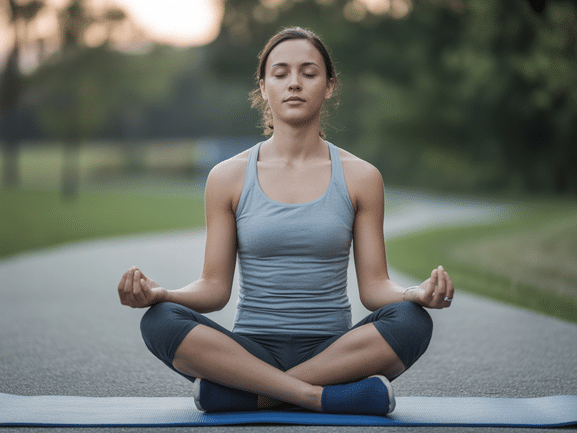How to Overcome Imposter Syndrome and Sleep Better Tonight
Do you lie awake at night, your mind racing with thoughts like “I don’t deserve this promotion” or “They’ll find out I’m a fraud”? If so, you’re experiencing imposter syndrome – and it might be the hidden culprit behind your sleepless nights.
<section>
<p>Research shows that <strong>over 70% of professionals</strong> experience imposter syndrome at some point in their careers. What's more concerning? This self-doubt doesn't just affect your work performance – it's directly linked to <em>stress-related insomnia</em> and poor sleep quality.</p>
<p>The good news? Ancient practices like <a href="https://vitalizen.app" title="Yoga e meditação online">yoga and meditation</a> offer proven solutions to break this destructive cycle. Let's explore how you can <strong>overcome imposter syndrome</strong> while improving your sleep quality naturally.</p>
</section>
<section>
<h2>What is Imposter Syndrome and How Does it Steal Your Sleep?</h2>
<p>Imposter syndrome is the persistent feeling that you're not qualified for your achievements, despite evidence of your competence. This psychological pattern creates a state of chronic stress that directly impacts your <strong>sleep-wake cycle</strong>.</p>
<p>When your mind is consumed with self-doubt, your nervous system remains in "fight or flight" mode. This elevated state makes it nearly impossible to transition into the relaxed state necessary for quality sleep. Moreover, the anxiety associated with imposter syndrome often leads to <em>racing thoughts at bedtime</em> – a common symptom of stress-related insomnia.</p>
<blockquote>"The mind that is anxious about future events is miserable." - Seneca</blockquote>
</section>
<section>
<h2>5 Signs Your Imposter Syndrome is Affecting Your Sleep</h2>
<p>Recognizing the connection between self-doubt and sleep issues is the first step toward healing. Here are five clear indicators:</p>
<ol>
<li><strong>Sunday Night Insomnia:</strong> You consistently struggle to fall asleep before work weeks, anticipating "being exposed" as incompetent</li>
<li><strong>3 AM Worry Sessions:</strong> You wake up in the middle of the night replaying work conversations or mistakes</li>
<li><strong>Perfectionist Overthinking:</strong> You spend hours in bed mentally rehearsing tomorrow's presentations or meetings</li>
<li><strong>Physical Tension:</strong> You notice muscle tightness, especially in your shoulders and jaw, when trying to sleep</li>
<li><strong>Avoidance Fatigue:</strong> You feel exhausted from constantly trying to prove yourself worthy</li>
</ol>
<p>If you recognize these patterns, you're not alone – and more importantly, there are effective solutions available through <strong>mindfulness practices</strong>.</p>
</section>
<section>
<h2>How Yoga and Meditation Transform Self-Doubt into Self-Confidence</h2>
<p>Scientific research consistently shows that <a href="https://www.ncbi.nlm.nih.gov/pmc/articles/PMC3111147/" rel="nofollow noindex" target="_blank">regular yoga practice reduces cortisol levels</a> and activates the parasympathetic nervous system – your body's natural relaxation response.</p>
<p>Specifically for confidence building, yoga works through:</p>
<ul>
<li><strong>Body Awareness:</strong> Physical poses help you reconnect with your strength and capabilities</li>
<li><strong>Breath Regulation:</strong> Controlled breathing techniques calm the nervous system</li>
<li><strong>Present-Moment Focus:</strong> Mindful movement breaks the cycle of future-focused anxiety</li>
<li><strong>Self-Compassion Practice:</strong> Yoga philosophy teaches acceptance of imperfection</li>
</ul>
<p>Meanwhile, <strong>meditation for self-doubt</strong> rewires negative thought patterns by creating space between you and your thoughts. Regular practice helps you observe self-critical thoughts without being consumed by them.</p>
</section>
<section>
<h2>3 Powerful Yoga Poses to Build Confidence and Prepare for Sleep</h2>
<p>Here's a simple <strong>bedtime yoga routine</strong> designed specifically to address imposter syndrome while preparing your body for rest:</p>
<h3>1. Mountain Pose with Affirmations (Tadasana)</h3>
<p><strong>Duration:</strong> 2 minutes</p>
<p>Stand tall with feet hip-width apart. As you breathe deeply, repeat: "I am capable, I am worthy, I belong here." This foundational pose grounds you in your inherent worth while promoting stability.</p>
<h3>2. Heart Opening Flow (Camel Variation)</h3>
<p><strong>Duration:</strong> 3 minutes</p>
<p>Kneeling on your bed or mat, place hands on your lower back and gently arch backward. This heart-opening sequence counters the protective, hunched posture we adopt when feeling inadequate.</p>
<h3>3. Legs Up the Wall (Viparita Karani)</h3>
<p><strong>Duration:</strong> 5-10 minutes</p>
<p>Lie on your back with legs elevated against a wall or headboard. This restorative pose activates your body's relaxation response while symbolically representing a shift in perspective.</p>
<p>Practice these poses 30 minutes before bedtime to <strong>sleep better with yoga</strong> while building lasting self-confidence.</p>
</section>
<section>
<h2>5-Minute Meditation for Overcoming Self-Doubt</h2>
<p>This guided practice specifically addresses the mental patterns that fuel imposter syndrome:</p>
<ol>
<li><strong>Settle In (1 minute):</strong> Find a comfortable position and take five deep breaths</li>
<li><strong>Body Scan (2 minutes):</strong> Notice areas of tension and breathe relaxation into them</li>
<li><strong>Thought Observation (2 minutes):</strong> When self-doubt arises, label it as "thinking" and return to your breath</li>
</ol>
<p>Remember, the goal isn't to eliminate all self-doubt but to change your relationship with it. Through consistent <strong>mindfulness for anxiety</strong>, you develop the resilience to face challenges without being overwhelmed.</p>
</section>
<section>
<h2>Real Success Stories: From Sleepless Nights to Confident Days</h2>
<p>Sarah, a marketing executive from Portland, shared: "I used to spend hours awake wondering if my team respected me. After just three weeks of following Vitalizen's confidence-building program, I'm sleeping through the night and presenting with genuine self-assurance."</p>
<p>Similarly, James, a software developer, found that incorporating <strong>yoga for confidence</strong> into his evening routine helped him overcome the fear of code reviews that had been disrupting his sleep for months.</p>
<p>These transformations aren't coincidental – they're the natural result of addressing both the mental and physical aspects of imposter syndrome through integrated mind-body practices.</p>
</section>



